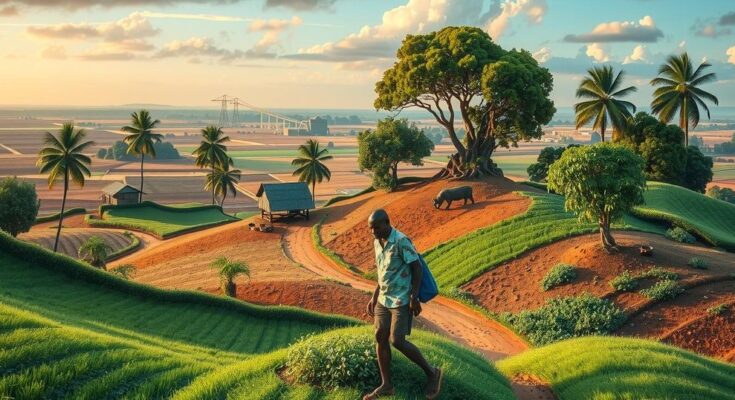Côte d’Ivoire has experienced notable economic growth and stability, with GDP averaging 6.4 percent over the last decade. While challenges like informal employment persist, the country is enhancing its resilience through economic diversification and climate adaptation measures, supported by the IMF. Emphasizing domestic revenue mobilization and a favorable business environment, Côte d’Ivoire aims to achieve upper middle-income status while addressing climate vulnerabilities critically.
Côte d’Ivoire, a beacon of growth and stability in West Africa, has seen remarkable economic performance with a GDP growth rate of 6.4 percent over the past decade and low inflation at 2.2 percent. However, challenges such as the prevalence of informal employment and climate vulnerability persist, necessitating continuous reform. With support from the International Monetary Fund (IMF), the nation is navigating these obstacles, working toward achieving upper middle-income status while embracing a strategy to diversify the economy and enhance climate resilience.
Recent consultations with the IMF reflect Côte d’Ivoire’s progress in implementing its development strategies. Minister of Finance and Budget, Adama Coulibaly, emphasized the importance of public investment in high-priority areas, which has aided in reducing poverty amid an influx of refugees. The partnership with the IMF has enabled the country to stabilize its economy and secure an improved sovereign debt rating. With an eye toward fighting climate challenges, the government has embraced reforms under the Resilience and Sustainability Facility (RSF), intending to bolster its response to climate vulnerabilities while aiming for sustainable growth.
Key to Côte d’Ivoire’s reform agenda is domestic revenue mobilization, which is essential for addressing social protection and infrastructure demands. As the nation aspires to an upper middle-income status, its fiscal discipline has put it on track to meet the West African Economic and Monetary Union’s deficit ceiling. The adoption of a medium-term revenue mobilization strategy aims to create a more equitable and effective tax system that garners broad public support, fostering independent revenue growth.
In promoting a favorable business climate, the Ivoirien government is focused on enhancing public services, especially in energy, while fostering human capital development and reducing informal work. By tackling gender disparities, providing vocational training, and improving health coverage, the government seeks to engage the private sector effectively. Adhering to the Financial Action Task Force’s recommendations is also a priority to remove Côte d’Ivoire from its “grey list.”
Addressing climate change is critical for Côte d’Ivoire, given its dependency on agriculture, particularly cocoa production, and its vulnerability to environmental shifts. The IMF plays a pivotal role by supporting initiatives to integrate climate considerations into public finance, strengthen governance around climate policies, and enhance agricultural safeguards. With a significant arrangement under the RSF, the country is positioned to implement an extensive climate action plan.
Recent commitments made during COP29 include innovative measures for climate financing, such as enhancing budget support coordination, promoting green finance, and accelerating adaptation project implementation aimed at sustainable growth. Through these holistic reform efforts, Côte d’Ivoire aspires to mitigate its climate risks while securing an economically sustainable future.
Côte d’Ivoire has emerged as a leading force in economic stability and growth within West Africa, propelled by reforms and strategic investments. Over the last ten years, its economy has demonstrated remarkable resilience, exhibiting robust GDP growth rates while keeping inflation in check. Despite these advancements, the country faces significant structural challenges, particularly within its labor market and vulnerabilities to climate change due to its dependence on agriculture and concentrated industrial activities in coastal areas. The government’s ongoing economic transformation agenda focuses on enhancing domestic revenue mobilization and diversifying the economy, supported significantly by collaboration with the IMF.
Côte d’Ivoire is poised to continue its trajectory toward upper middle-income status, contingent on bolstering domestic revenue and fostering economic diversification. By prioritizing investments in social infrastructure and mitigating climate change vulnerabilities, the country is proactively addressing its structural challenges. Moreover, the collaboration with the IMF underscores the importance of strategic reforms aimed at sustainable growth and resilience against a backdrop of climate risks, all crucial for the nation’s long-term economic health.
Original Source: www.imf.org




